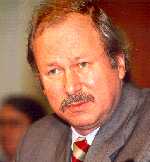 Val
KOROMZAY, Director, Country Studies Branch, Economics Department,
OECD, Since October 1998.
Val
KOROMZAY, Director, Country Studies Branch, Economics Department,
OECD, Since October 1998.
Professional Experience:
1993-1998,
Deputy Director, Country Studies Branch.
1991-1993 Head, Central and Eastern Europe Division, Economics Department,
OECD
1986-1991 Head, Balance of Payments Division, Economics and Statistics
Department, OECD
1981-1986 Counsellor to the Head of the Economics and Statistics Department,
OECD
1978-1981 Senior Staff Economist for International Economic Policy, Council
of Economic Advisors, Washington D.C.
1975-1978 Economist, International Finance Division, Board of Governors
of the Federal Reserve System, Washington D.C.
1971-1975 Instructor, Department of Economics, Dartmouth College, Hanover,
New Hampshire
1964-1966 Peace Corps Volunteer, Tigré Province, Ethiopia
Academic Background:
1967-1971
Yale University, Department of Economics
1960-1964 Yale College
Personal details:
Born
February 14, 1943 in Amsterdam, Holland.
U.S. citizen. Speaks English, French and some Hungarian.
Married: (wife Mary Blanche)
One daughter, Kristina
Abstract of the speech:
Economic reform, when seen from the perspective of politics, boils down essentially to a modification of the rules that create and distribute economic rents within society. This is what makes reform difficult: no matter how large the overall gains that can be expected from reform, there are those who will lose from it, at least in a static sense, and hence oppose it. Against this background, my presentation addresses, through a range of specific examples, four distinct aspects of economic reform:
1. Preconditions
for initiating major economic reforms - getting a mandate that "things
have to change".
2. The political economy of reform - "everything at once" versus
"targets of opportunity".
3. Implementation issues - overcoming bureaucratic inertia.
4. Institutionalizing the reform process: the impossibility of standing
still - either you keep moving forward or you start to slide back.